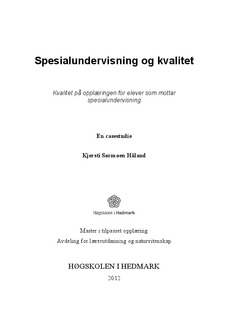Spesialundervisning og kvalitet: Kvalitet på opplæringen for elever som mottar spesialundervisning: En casestudie
Abstract
Norsk: I denne oppgaven settes søkelyset på spesialundervisning og kvalitet ved å drøfte kvalitet på opplæringen for elever som mottar spesialundervisning. Denne elevgruppas hverdag er i mange tilfeller preget av manglende helhetlig opplæringstilbud og utestengning fra fellesskapet i klassen. Da utviklingen går i retning av økende antall elever med vedtak om spesialundervisning, samtidig som resultatene av effekten av denne spesialundervisningen er tvetydig, er det viktig å undersøke hva som gir kvalitet på denne undervisningen.
Den teoretiske rammen for oppgaven handler om inkludering og anerkjennelse. Inkludering handler om å skape inkluderende skoler hvor alle har sin plass og tilhørighet i et fellesskap. Aksel Honneths anerkjennelsesbegrep gir en forklaringsnøkkel til hvordan erkjennelse og krenkelse kan bygge opp eller rive ned menneskers selvtillit, selvrespekt og selvverd. Dette er verdier som er nødvendige for å kunne være i stand til å bli aktører i det sosiale fellesskapet. Nyere forskning på feltet spesialundervisning gir noen bidrag til definisjonen av kvalitet. Kvalitet blir videre sett i sammenheng med effektundersøkelsene til Niels Egelund og Susan Tetler, hvor man har pekt på hva som gir resultater i spesialundervisningen.
Designet for undersøkelsen er en casestudie hvor to elever med vedtak om spesialundervisning er fulgt gjennom hver sin skoleuke. Målet for undersøkelsen er å se hva som faktisk skjer i møte med lærer og medelever i den ordinære undervisningen og i spesialundervisningen. Gjennom kvalitativt tilnærming er metodene observasjon, intervju og dokumentanalyse brukt i datainnsamlingen. Foreldrenes stemme er også løftet fram gjennom intervjuer.
Drøftingen tar utgangspunkt i funnene i undersøkelsen og diskuteres i relasjon til forskningsspørsmålene. Kvalitet på opplæringen for elever som mottar spesialundervisning handler om at elever opplever faglig og sosial utvikling, har lærere som synliggjør forventinger i undervisninger og hvor foreldrenes innvirkning på elevenes motivasjon og innsats blir anerkjent av skolen. Gjennom inkludering i fellesskapet og anerkjennelse av både elever og foreldres bidrag til opplæringen, er dette viktige faktorer for opplevelse av kvalitet på opplæringen for elever som mottar spesialundervisning. English: This paper focuses on special education and quality, with a discussion on quality in education for pupils with special educational needs. The situation for these pupils bears the stamp of lacking general offer of education and locking out of participation in the class’s social life. The growing number of pupils with special educational needs, coinciding with the ambiguity of the effects of special education, makes it necessary to examine what gives quality to this education.
The theoretical framework of this paper is about inclusion and acknowledgment. Inclusion is about creating inclusive schools where all the pupils belong to a community. Aksel Honneth’s idea of acknowledgment gives a key to explaining how acknowledgment and offence build up or brake down pupils’ self-confidence, self-respect and self-value. These values are necessary to be able to take part in the social life. New research in special education gives some contributions to the defining quality. Quality is seen in connection with the effect research of Niels Egelund and Susan Tetler, where what gives results in special education is pointed out.
The design of this research is a case study where two pupils with special educational needs are observed through a week at school. The aim of this research is to see what actually happens when they meet the teachers and the other pupils in the ordinary lessons and in the special education lessons. In a qualitative approach the methods observation, interview and document analyses are used in the data collection. The voice of the parents is brought up forward through interviews.
The discussion starts with the research discoveries which are seen in connection with the research questions. Quality in education for pupils with special educational needs is about the students experiencing professional and social development, having teachers that visualise expectations in the lessons, and where the parents’ influence on students’ motivation and efforts is acknowledged by the school. Through inclusion in class fellowship and acknowledging the contributions from students and parents in the education, these are important factors to experience quality in education for the students with special educational needs.
Description
Mastergradsoppgave i tilpasset opplæring, Avdeling for lærerutdanning og naturvitenskap, Høgskolen i Hedmark, 2012
